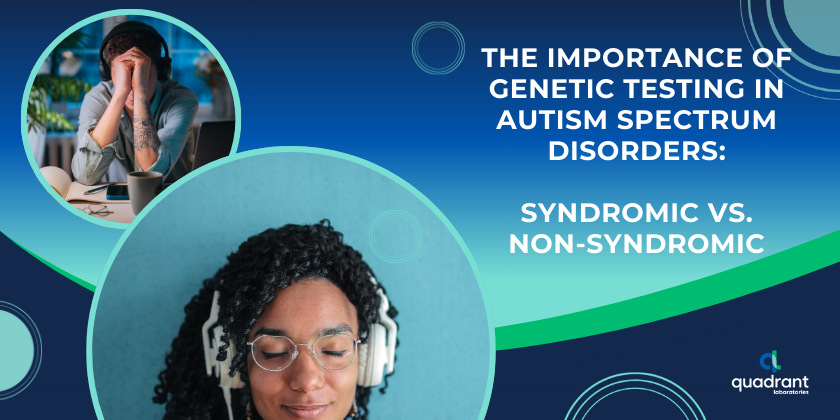
While the exact causes of autism spectrum disorder (ASD) remain elusive, researchers have identified various factors contributing to its development, including both genetic and environmental influences. Among these, genetic factors play a significant role, with recent advancements in genetic testing shedding light on the underlying mechanisms.
When considering the genetic foundation of ASD, it’s crucial to distinguish between syndromic and non-syndromic causes. Syndromic ASD refers to cases where autism is one of several features within a broader genetic syndrome, such as Fragile X syndrome or Rett syndrome. In contrast, non-syndromic ASD encompasses cases where autism is the primary or sole clinical manifestation without additional features of a known syndrome.
Understanding the distinction between syndromic and non-syndromic causes is essential for several reasons:
Clinical Management
Recognizing whether ASD is syndromic or non-syndromic aids clinicians in tailoring appropriate medical management and interventions. Individuals with syndromic ASD may require specialized treatments targeting the specific features of the underlying syndrome, whereas those with non-syndromic ASD may benefit from more generalized therapeutic approaches.
Prognosis and Counseling
Differentiating between syndromic and non-syndromic ASD helps in providing accurate prognostic information to families. Syndromic forms of ASD often have associated medical and developmental concerns beyond autism, influencing long-term outcomes and family planning decisions. Genetic counseling plays a crucial role in addressing these considerations by offering families personalized guidance based on their child’s genetic profile.
Research and Understanding
Studying the genes behind both syndromic and non-syndromic ASD helps us grasp better why autism varies so much and how it works in our bodies. Identifying specific genetic variants associated with ASD provides valuable insights into disease mechanisms, paving the way for targeted therapies and precision medicine approaches.
Given the complexity and genetic diversity of ASD, comprehensive genetic testing has emerged as a valuable tool in clinical practice. Genetic testing, particularly through panels like Quadrant Laboratories’ ASD/ID Gene Panel, offers several advantages:
Comprehensive Analysis
Quadrant Laboratories’ ASD/ID Gene Panel examines over 285 genes known to be associated with autism and intellectual disabilities, ensuring a thorough evaluation of potential genetic contributors.
Early Detection and Intervention
Genetic testing enables early identification of genetic risk factors for ASD, allowing for timely intervention and support services that can positively impact developmental outcomes.
Personalized Medicine
By clarifying the genetic basis of ASD in individual patients, genetic testing facilitates personalized treatment strategies tailored to each patient’s unique genetic profile.
Understanding the distinction between syndromic and non-syndromic causes of ASD highlights the importance of genetic testing in clinical practice. Through comprehensive genetic analysis, clinicians can provide personalized care, offer more accurate prognostic information, and contribute to advancing our understanding of autism’s genetic landscape.
Quadrant Laboratories’ ASD/ID Gene Panel must be ordered by a healthcare provider, information about the testing can be accessed on our website at www.quadrantlaboratories.com.
References:
- Hallmayer, J., Cleveland, S., Torres, A., Phillips, J., Cohen, B., Torigoe, T., … & Risch, N. (2011). Genetic heritability and shared environmental factors among twin pairs with autism. Archives of general psychiatry, 68(11), 1095-1102.
- Geschwind, D. H., & State, M. W. (2015). Gene hunting in autism spectrum disorder: on the path to precision medicine. The Lancet Neurology, 14(11), 1109-1120.
- Bernier, R., Golzio, C., Xiong, B., Stessman, H. A., Coe, B. P., Penn, O., … & Eichler, E. E. (2014). Disruptive CHD8 mutations define a subtype of autism early in development. Cell, 158(2), 263-276.



